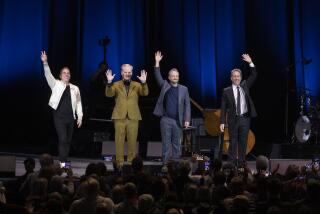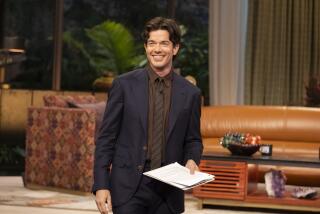Living on love, or words to that effect
It’s Saturday night at a raucous hip-hop concert at Biola University, a religious college in La Mirada. Enyce is in the house. So are Ecko, FUBU Platinum, Rocawear and a multitude of hot, high-priced, name-brand, urban designer fashions that might as well be labeled “You Spent What for That?!” During the freestyle rap, an improvisational riff is inspired by a guy in the audience waving one of his new must-have Js, top-of-the-line $200 Air Jordan XVIIs, athletic shoes in black and white with a copper strip gleaming on the heel.
Then the poets take the stage.
GaKnew wears old tennis shoes, generic jeans and a basic blue-and-white sweater. A former rapper, he keeps the rhythm going with his lyrical “Vision of an Underground Poet.”
“Well, I done quit my job,” he starts, speaking up-tempo, snatching the attention of the crowd. He closes with his signature “I Am,” singing, “Black man ... / African American, mystery man ... / Colored boy, nigga-ro, slave when ... / will you comprehend you’re a hu-man.”
Thea Monyee performs in a gray turtleneck she’s borrowed so often that her roommate finally gave it to her and shoes she will describe only as “not Prada.”
This gig pays, hallelujah.
GaKnew and Monyee get $200. Each. They make another $150 selling videos of his performance film and their self-produced chapbooks. Monyee meets her goal. She sells out of her “Escaping the Cocoon: Falling in Love With Life,” except for the nine taken from their table while they’re on stage by students who think the pamphlet-sized books are free.
The loss, $45, is a big deal, because as Monyee enthuses endearingly in her romantic ode, they are “Broke Lovers”:
You mean more to me than just your paycheck,
So you don’t ever have to sweat over keeping up with the Jones’s,
You see what we lack in finance, we more than make up for in romance, and can’t nobody slow dance to Lenny Williams the way that we do!
The resumes are unique
He’s 26. She’s 21. Economically, they don’t stand out in their demographic. Young and broke go together like love and marriage.
They don’t stand out at a hip-hop concert or a spoken-word performance. He’s slender, of medium height, bearded, with curly black hair and, as his lady love says, quoting from his poem “I Am,” “root-beer-bottle brown” eyes and skin the color of “deep wine.” She’s nearly as tall as he is, also slender and, through the eyes of the poet who loves her, the color of “caramel ... a golden tone, with pillow-like cheeks, big dimples and a smile like a 5-year-old cheesing” for the camera.
They do stand out in their occupational preference. On how many job applications can one reasonably write: Poet. Artist. Dreamer. Believer.
Spoken word is to poetry as stand-up is to comedy or hip-hop is to music. Expressive performance art, it’s original poetry recited, generally from memory, with dramatic attitude, faster than routine conversation, and often accompanied by emotive gestures. Think in-your-face beatniks, front and center stage. On speed.
It’s big. Mainstream big. “Russell Simmons’ Def Poetry Jam” is one of the hottest tickets on Broadway. HBO has announced it will air a third season of Simmons’ “Def Poetry” show. (Monyee appeared on it last summer, and happily received a $625 paycheck.) Clubs routinely charge a $10 cover to listen to artists who cost nothing to hear last year.
It’s big enough that maybe they can make a living. Like Coco Brown. He took spoken word to the top of the Billboard charts two years ago with his melodic baritone in “Sundress,” a seductive paean to women.
This is not how GaKnew (pronounced ga-NU, ne Lanny Wilson) planned to make a living. At Santa Monica College, he studied filmmaking and art for a year until his mother moved to Virginia, forcing him, at age 18, to get his own apartment and a full-time job. To support his art, he works full time at Kinko’s, making $9.99 an hour.
This is not how Monyee (pronounced moan-YAY, nowhere near “money,” nee Griffith) planned to make a living. At USC, she aced premed studies during her freshman year before her parents divorced, wiping out any hope of paying the next tuition bill. Disillusioned, she took a break from college and got a job at a rental car agency, where she earns $9 an hour. She’s back in school at the much more affordable Cal State Dominguez Hills, but premed gave way to English when she caught the fever.
“Poetry is a starting point for a lot of things. Lanny works with film. I’d like to write novels. It’s a way to break in,” Monyee says. “It opens a lot of doors. I’ve gotten calls from producers. I have no idea where I’m going, but I’m going to ride the poetry horse until I can ride no more.”
“You can’t make a living off of poetry,” says GaKnew. He knows plenty of poets who are as broke as they are. But he won’t give it up. “Poetry will always be there,” he explains. “A poet is who I am. Like a man is a man, I am a poet. Even if I’m not performing, I’ll be a 79-year-old man writing poetry.”
Hard-earned money
It’s a rainy Friday night. They show up at Midnight Records in West L.A. to host their weekly open-mike Safe House Poetry Jam. It’s canceled unexpectedly, eliminating the possibility of making a few bucks.
It’s a standing-room-only Thursday night at Lush in Santa Monica, home of the Flypoet Spoken Word & Music Showcase, a monthly melange of poets and musicians who perform while an artist paints on a large canvas just offstage, immediately capturing their essence. Monyee’s teasing tonight, briefly previewing the show she’ll put on Jan. 9, when she’s a featured poet. She needs to draw a crowd because she’ll make $5 for every patron who says her name at the door.
Outside the club, she parks her 4-year-old Toyota Camry on the street, avoiding the valet fee, the tip and car envy.
... because truth be told, nobody in L.A. has a car that is paid for,
So I would roll with you, in a bucket, missing three doors!
And I’d still feel warm as though I was rolling in the leather seats of a 2003 Escalade,
owned by a couple who constantly argues over still not making enough money....
It’s a Wednesday night, and GaKnew is not making as much as he hopes at Doboy’s Dozens Coffeehouse in the Crenshaw district. He’s screening “Thoughts of Egression,” his performance film, at $10 a ticket. His profits evaporate when the projector he reserved is not available after all, and Doboy’s owner bails him out at double the original cost.
The following Wednesday, he is featured at the Magic Johnson Starbucks on Centinela near LAX. His “I Am” draws a standing ovation. He pockets $15.
GaKnew needs every dollar, because his film has been accepted by the New York International Independent Film and Video Festival. The $1,000 entrance fee is due by the end of January. Then there’s plane fare to New York in April.
The couple also are looking for paying jobs because they’re saving big-time for their “Broke Lovers” wedding. They’re engaged, although the only thing Monyee has to show off on the third finger of her left hand is a manicured, unpolished fingernail. Their love, she says in the second stanza, “is not based on BLING BLING, Because ... ‘I don’t need no diamond rings.’ ”
It’s a packed Tuesday night at Da’ Poetry Lounge at the Greenway Court Theater on the campus of Fairfax High School. Admission is $5, none of it flowing into the wallet of Monyee. She competes in a poetry slam judged by members randomly chosen from the audience. She usually wins, which is how she made the Los Angeles team that competed against GaKnew’s Hollywood team at the Poetry Slam Nationals in Minneapolis in August.
This night, first place pays $50. She comes in second. She’s exhausted from working at Enterprise Rent-a-Car from 6 a.m. to 3 p.m., studying for finals (only three semesters to go!) and performing everywhere she can.
On Dec. 25, when he picks her up from work, GaKnew surprises Monyee with a sweet marquis-cut diamond ring. To pay for it, he cut out all “extracurricular activity,” held onto the Biola University check and saved money from his day job and whatever he made at other readings. Thanks to his winning raffle ticket, they’ll honeymoon briefly in Hawaii.
The next day, they’re performing at a Kwanzaa festival at a church in Long Beach. They don’t get paid, again.


